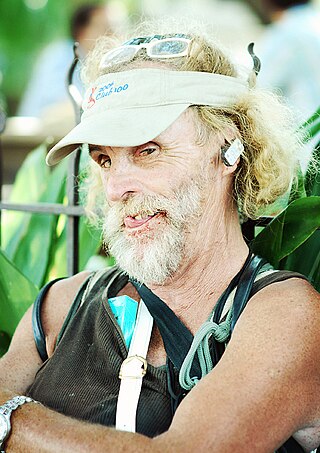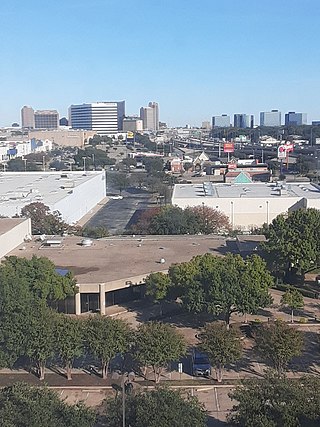
Zero waste, or waste minimization, is a set of principles focused on waste prevention that encourages redesigning resource life cycles so that all products are repurposed and/or reused. The goal of the movement is to avoid sending trash to landfills, incinerators, oceans, or any other part of the environment. Currently 9% of global plastic is recycled. In a zero waste system, all materials are reused until the optimum level of consumption is reached.

Albert Leslie Cochran was an American homeless man, peace activist, cross-dresser, urban outdoorsman, and outspoken critic of police treatment of the homeless. Cochran was known in Austin as Leslie.

The National LGBT Chamber of Commerce (NGLCC) is a U.S. not-for-profit advocacy group that aims to expand the economic opportunities and advancement of the LGBT business community. Its headquarters are in NW in Washington, D.C. NGLCC is the exclusive certifying body for LGBT-owned businesses known as LGBT Business Enterprises (LGBTBEs), and advocates for LGBT business inclusion in corporate and government supplier diversity programs. In October 2017, the organization changed its name from the National Gay & Lesbian Chamber of Commerce to National LGBT Chamber of Commerce to better reflect the entire LGBT business community it serves.

Music Millennium is an independent record store located in Portland, Oregon. It was opened by Don McLeod, his wife Laureen, and Dan and Patty Lissy in 1969. It is currently the largest and oldest record store in the Pacific Northwest.
Keep Austin Weird is a slogan coined by Red Wassenich in 2000 while giving a pledge to "The Lounge Show", a quirky, eclectic radio show on an Austin radio station KOOP Radio. He began printing bumper stickers in July 2000 and operated the website keepaustinweird.com until his death in 2020 and published Keep Austin Weird: A Guide to the Odd Side of Town.

The American Independent Business Alliance (AMIBA) is a non-profit organization that represents the interests of local independent businesses, helps communities develop strong local economies through nurturing local entrepreneurs, and promotes citizen engagement in local economic development. AMIBA helps communities to: launch and successfully operate "buy local" campaigns; facilitate group purchasing and marketing among local businesses, and; other programs to support community enterprise.
New Seasons Market is a chain of neighborhood grocery stores operating in the Portland, Oregon metro area, and southwestern Washington. Some of the products offered are organic and produced locally in the Pacific Northwest, but conventional groceries are also sold.
Austin Independent Business Alliance (AIBA) is an organization of independent, locally owned firms in Austin, Texas and is composed of over 300 member businesses. It was started in 2001 by several local businesses and citizens as a way to help independent businesses compete successfully against corporate chains. The group is among at least 60 Independent Business Alliances around the country affiliated with the American Independent Business Alliance.
Gregory-Portland Independent School District is a public school district based in Portland, Texas (USA).

Since it earliest days, the economy of Louisville, Kentucky, has been underpinned by the shipping and cargo industries. Today, Louisville is home to dozens of companies and organizations across several industrial classifications.
Virtual volunteering refers to volunteer activities completed, in whole or in part, using the Internet and a home, school buildings, telecenter, or work computer or other Internet-connected device, such as a smartphone or a tablet. Virtual volunteering is also known as online volunteering, remote volunteering or e-volunteering. Contributing to free and open source software projects or editing Wikipedia are examples of virtual volunteering.

Bicycle use in Portland, Oregon has been growing rapidly, having nearly tripled since 2001; for example, bicycle traffic on four of the Willamette River bridges has increased from 2,855 before 1992 to over 16,000 in 2008, partly due to improved facilities. The Portland Bureau of Transportation says 6% of commuters bike to work in Portland, the highest proportion of any major U.S. city and about 10 times the national average.
A sustainability organization is (1) an organized group of people that aims to advance sustainability and/or (2) those actions of organizing something sustainably. Unlike many business organizations, sustainability organizations are not limited to implementing sustainability strategies which provide them with economic and cultural benefits attained through environmental responsibility. For sustainability organizations, sustainability can also be an end in itself without further justifications.

North Dallas is an area of numerous communities and neighborhoods in Dallas, Texas. The phrase "North Dallas" is also sometimes used to include any suburb or exurb north of Dallas proper within the metropolitan area. The majority of North Dallas is located in Dallas County, while a small portion is located in Collin and Denton counties. North Dallas generally includes areas of Dallas north of Northwest Highway, along with Lake Highlands and areas of Dallas north of IH-635 known as Far North Dallas. The area has strong social and economic ties to the Dallas enclave of Park Cities, and two inner suburbs of Dallas, Richardson and Addison.

"Keep Portland Weird" is a popular slogan that appears on bumper stickers, signs, and public buildings throughout Portland, Oregon and its surrounding metro area. It originated from the "Keep Austin Weird" slogan and was originally intended to promote local businesses, though it has since evolved into an all-encompassing slogan that secondarily promotes individuality, expressionism, local art, as well as atypical lifestyle choices and leisure activities. The slogan frequently inspires articles and debate that attempt to quantify the exact level to which Portland is considered weird, unusual or eccentric. It has been called the unofficial motto of Portland, as well as the informal mantra of the city's residents.

Heine Brothers' is a coffee roaster and coffee shop chain founded in 1994 by Gary Heine and Mike Mays in Louisville, Kentucky. Mays is President of the company.
Austin, Texas, has one of the most prominent and active LGBT populations in the United States. Austin was acclaimed by The Advocate in 2012 as part of its Gayest Cities in America, and was recognized by Travel and Leisure as one of America's Best Cities for Gay Travel. Much of Austin's gay nightlife scene is clustered around 4th Street. LGBT activism groups Atticus Circle and Equality Texas are headquartered in Austin.

The New Economy Movement in the United States is a group of organizations that are attempting to restructure the current economic system. The movement prioritizes human well-being over economic growth. Its primary goal is to localize the economy in an attempt to spread wealth and promote sustainable business practices. The New Economy movement challenges both neoclassical and Keynesian economics to include theories of ecological economics, solidarity economy, commons, degrowth, systems thinking and Buddhist economics. The movement promotes more public ownership of the economy through organizational structures such as cooperatives, and state-owned banks. The goal of these changes is to remove or alleviate harmful environmental and social impacts of capitalism through alternative economic as well as political practices. A principal leader of the movement is the political economist and activist Gar Alperowitz, who, with others, promote the democratizing ownership of businesses and the economy as a means to achieve a sustainable, fair, and equal society.

Weird Portland United is a nonprofit organization based in Portland, Oregon, United States. Brian Kidd, who is known as the Unipiper, founded the collective in 2018 in an effort to "Keep Portland Weird".











